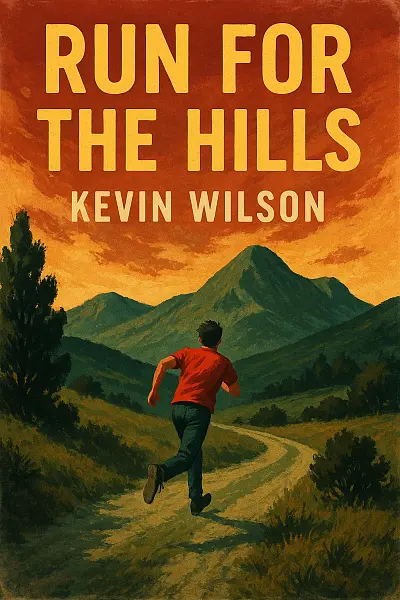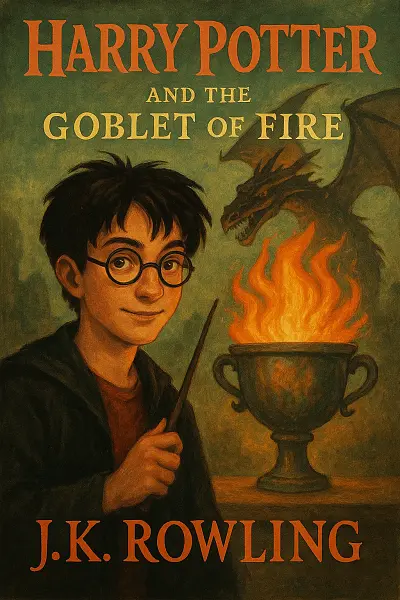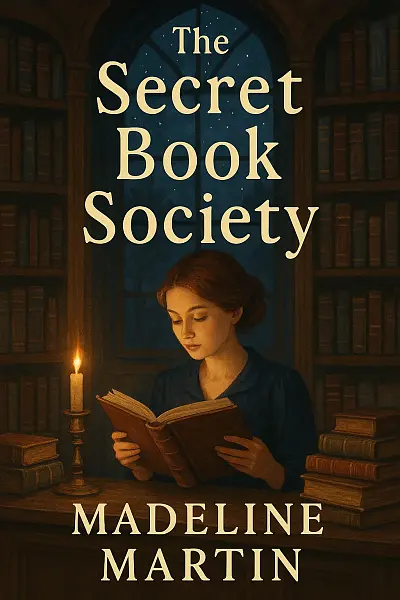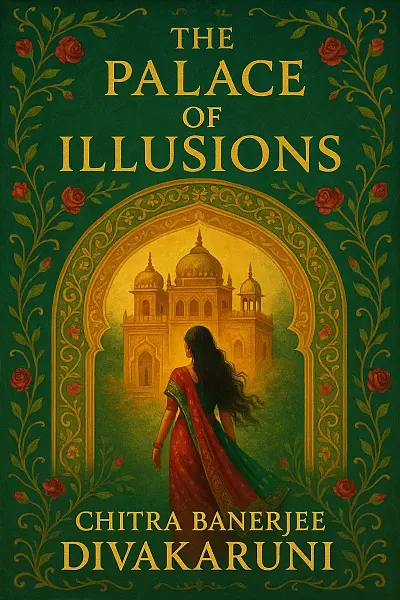
Run for the Hills
by: Kevin Wilson
Madeline Hill keeps to a quiet life with her mom on their Tennessee farm, her world pretty small—until one day, Reuben shows up, claiming he's her half-brother. Suddenly, the steady routine bursts open: Reuben has tracked down their wayward dad and insists Maddie join his cross-country quest to find their scattered siblings, all products of their father’s mysterious, shifting life.
As they pile into a quirky road trip with strangers-turned-family, secrets, resentments, and wild hopes all bubble up. What’s at stake? The possibility that they might finally understand what family really means—and decide if they're ready to risk letting each other in.
Wilson’s trademark deadpan charm and big-hearted humor make this ride irresistibly messy, uncertain, full of both chaos and hope.
"Sometimes the only way forward is to run toward what frightens you, not away from it."
Let's Break This Down
The Author's Voice
Atmosphere
Kevin Wilson conjures a mood that oscillates between quirky warmth and undercurrents of anxiety. Expect small-town oddity wrapped in a gently surreal, emotionally charged shell. Scenes crackle with offbeat charm yet there’s a thread of discomfort that pulses beneath the surface, keeping readers slightly on edge while still offering pockets of wry humor and genuine pathos.
Prose Style
Wilson’s sentences are crisp, direct, and delightfully unpretentious. He favors short, rhythmic bursts—you’ll find few flourishes, but absolutely no wasted words. The dialogue is razor-sharp, infused with awkwardness and heart, while narrative description leans into the specific and sensory rather than lofty or abstract. There’s an ache behind the wit, giving every paragraph a little extra weight.
Pacing
The pacing is measured—never in a hurry, but never meandering either. Wilson knows how to linger on potent moments, letting tension simmer just beneath the narrative’s surface. Chapters move quickly, the story unfolding in tight scenes that make for bite-sized, compulsively readable chunks. There’s enough forward momentum to keep you turning pages, but the story also breathes, allowing for those subtle emotional beats to land.
Tone & Mood
Playful yet haunted. You’ll find yourself chuckling at the absurd, only to stumble into a pang of sadness or nostalgia the next page. Wilson’s tone is decidedly off-kilter: a little melancholic, frequently absurd, always deeply human. The mood is like walking through a fog sprinkled with confetti—bizarre, beautiful, a little bittersweet.
Character Voice & Perspective
Distinct, idiosyncratic internal monologues abound. Wilson excels at capturing the stray, spiraling thoughts of characters who feel both profoundly weird and achingly real. Expect damaged, lovable misfits; expect dry, self-aware humor mixed with raw, unfiltered vulnerability. Each voice feels both intimate and unreliable, inviting you in while keeping a secret or two close.
Rhythm & Flow
There’s a subtle musicality to the way Wilson structures his story— lean, punchy paragraphs give way to slow, inhaled silences. You’ll notice how scenes end on a beat, like the last note of a strange, catchy song. The flow never drags and always leaves you hungry for the next page, like a secret you’re just about to uncover.
In a nutshell:
If you’re drawn to books where the ordinary meets the outlandish, with deft, emotionally loaded prose and a perfect mix of quirky and heartfelt, Run for the Hills is your jam. Be ready for an experience that’s off-center in the best possible way.
Key Moments
- Opening chaos: a disastrous wedding-turned-road-trip you won’t see coming
- Quirky, heartfelt banter—Wilson’s signature awkward charm turned up to eleven
- A runaway bride and a hapless best man: accidental heroes on the lam
- Every chapter’s a messy, hilarious meditation on what it means to flee your old life
- Page 148: the diner confession that breaks your heart, then stitches it back up
- Lightning-fast pacing—feels like the book is sprinting right alongside the characters
- Bittersweet, unexpectedly profound finale: running away just might mean finding home
Plot Summary
Run for the Hills by Kevin Wilson follows the tumultuous summer of sixteen-year-old Ethan Watts, who, after his parents' messy divorce, is sent to spend time with his eccentric Aunt Lila in the rural hills of Tennessee. Initially resistant, Ethan meets charismatic neighbor Mandy, whose rebellious streak draws him into a whirlwind of adventures and questionable decisions. The plot thickens when a local house fire sparks rumors and suspicion, threatening to unravel community secrets and implicate Mandy and Ethan. As suspicion mounts and relationships strain, Ethan must grapple with loyalty, truth, and the courage to confront painful realities. Ultimately, at the story’s climax, Ethan takes responsibility for his choices, leading to a bittersweet but hopeful reconciliation with his parents and newfound self-awareness as he prepares to return home.
Character Analysis
Ethan starts out sullen and confused, grappling with anger over his fractured family. Throughout the novel, under Aunt Lila’s quirky yet genuine guidance and Mandy’s exhilarating risk-taking, Ethan is pushed out of his comfort zone—he’s forced to re-examine his own values and fears. Mandy functions as a catalyst: her mix of vulnerability and defiance exposes Ethan to experiences and ethical dilemmas he’s never faced. By the end, Ethan matures noticeably, no longer running from his problems but instead learning to accept and address them with empathy and honesty.
Major Themes
At its heart, the book digs into the challenges of coming of age amid dysfunction and change, exploring how family upheaval can force teens into defining moments. Truth versus self-preservation is a recurring tension; the characters constantly weigh honesty against the instinct to protect themselves or others, particularly when secrets about the fire start to surface. Belonging and identity are woven throughout—Ethan’s struggle to fit in, both in his family and new environment, mirrors the wider question of how we discover our place in a fractured world.
Literary Techniques & Style
Kevin Wilson’s prose is witty, direct, and full of subtle humor, often using dialogue and sharp observation to reveal character. The first-person narrative draws readers deeply into Ethan’s anxieties and growth, creating intimacy and immediacy. Symbolism is rife—the recurring image of fire stands for both destruction and renewal, cleverly paralleling the family’s breakdown and tentative restoration. Metaphors anchor Ethan’s sense of alienation, such as the hills themselves representing the ups and downs of emotional recovery.
Historical/Cultural Context
Set in contemporary, small-town Tennessee, the novel captures the isolation and intimacy of rural America, spotlighting both the close-knit gossip culture and lack of options for escape. The community’s attitudes toward divorce and mental health subtly inform the struggles and silences Ethan and his family face, reflecting broader social stigmas prevalent in parts of the American South.
Critical Significance & Impact
While Run for the Hills isn’t considered a canonical work yet, it’s praised for its sharp, compassionate look at adolescent turmoil and broken families—a fresh take on familiar themes. Critics typically applaud Wilson’s deft character work and honest, unsentimental treatment of difficult issues. The story resonates with readers who crave realistic coming-of-age journeys and the messy, sometimes hopeful, path to forgiveness and self-understanding.

Escaping the past, one wild mile at a time—an offbeat road trip reckoning
What Readers Are Saying
Right for You If
Hey, so here’s the lowdown on Run for the Hills by Kevin Wilson and whether it’s your next must-read or a potential skip:
Who’s Gonna Love This:
- If you’re into quirky family dramas with a touch of offbeat humor and storytelling that balances heart and absurdity, this will totally hit the spot.
- Fans of Kevin Wilson’s other books, like Nothing to See Here, are probably going to eat this up—it’s got that same clever, slightly oddball vibe.
- Anyone who likes character-driven novels where the relationships really take center stage, especially stories about complicated marriages and parenting, will feel right at home.
- If you appreciate books that mix genuine emotion with a little bit of chaos and wry, witty dialogue, honestly, you’ll have fun with this one.
- It’s definitely for people who enjoy contemporary fiction that’s not afraid to get a little weird, but still keeps the characters totally relatable.
Who Might Want to Skip:
- Hardcore action lovers or folks who need a fast-paced, twisty plot—this story kinda unfolds at its own quirky pace, so if you crave suspense or high-stakes drama, you might find yourself drifting.
- Readers who prefer super straightforward, realistic storytelling over something a little eccentric or unconventional might not totally vibe with the way Wilson writes.
- If you really want a clear-cut, neatly resolved ending, just a heads-up: this book is more about the journey than tidy conclusions.
Bottom line: If you love heartfelt, weirdly funny looks at family and don’t mind a bit of literary oddness, you’ll probably adore this. But if you’re looking for adrenaline or no-nonsense realism, you might want to try something else!
What You're Getting Into
Run for the Hills by Kevin Wilson is a quirky, heartfelt novel about a mismatched pair who impulsively flee their everyday lives and embark on an unpredictable road trip across the American South. Along the way, they grapple with hidden fears, unexpected friendships, and the yearning for a fresh start, all set against a backdrop of offbeat roadside attractions and small-town secrets. With Wilson’s signature blend of wit and poignancy, this story promises a wild ride packed with big questions about love, escape, and what it really means to find your place in the world.
Characters You'll Meet
-
Calvin: The sensitive, anxious young boy at the heart of the story whose struggles with fear and uncertainty set the whole wild journey into motion. His growth and bravery become the emotional center of the book.
-
Poppy: Calvin’s loving and eccentric mother, determined to help her son no matter the cost—her impulsive decisions propel the family into increasingly absurd situations, making her the story’s chaotic catalyst.
-
Mitchell: Poppy’s partner and Calvin’s stepfather figure, caught between wanting stability and getting swept along in Poppy’s schemes. His patience and dry humor provide much-needed balance and comic relief.
-
Rosie: Calvin’s resourceful friend, quick-thinking and grounded, whose loyalty helps Calvin face his anxieties. She gives the story its heart and helps widen Calvin’s world.
-
Lucretia: The enigmatic neighbor whose mysterious past and peculiar advice keep the family on their toes. She adds both intrigue and wisdom, shaping the family’s journey in unexpected ways.
More Like This
Fans of Fredrik Backman's A Man Called Ove will find themselves drawn into the quirky, quietly heartwarming world that Kevin Wilson crafts in Run for the Hills. Just like Backman's beloved curmudgeon, Wilson's characters are endearingly flawed and their emotional journeys bring a satisfying blend of laughter and tenderness. If found families and unexpected bonds tug at your heartstrings, you’ll absolutely connect with the same underlying warmth here.
Reminiscent of Eleanor Oliphant Is Completely Fine by Gail Honeyman, Wilson’s latest also delves into the messy, awkward spaces of human connection, revealing how vulnerability and humor intertwine. Both novels thread humor through hardship, allowing readers to root for loners learning, sometimes painfully, how to belong. There’s a similar sense of hope woven into the mundane details, making each small triumph matter.
On a screen-inspired note, Run for the Hills channels the bittersweet, oddball charm of the TV series Schitt’s Creek. The gradual transformation of its characters, finding unlikely solace and kinship in a tight-knit community, feels like it could take place right down the road from the Rosebud Motel. Wilson’s uncanny ability to mix sharp wit with genuine affection leaves you with that same, glowing sense of optimism that fans of the show rave about.
Critic's Corner
What do we owe the people who make us—and break us? In Run for the Hills, Kevin Wilson transforms a sprawling, messy American family into a kaleidoscope of longing and hope, daring us to consider whether blood is thicker than the stories we’ve told ourselves. With biting humor and a sly tenderness, Wilson compels us to face the absurdity and necessity of connection in a fractured world, poking at the edges of identity, inheritance, and forgiveness.
Wilson’s prose is a deft blend of unvarnished observation and quirky wit, reminiscent of his earlier works but more assured in its eccentricities. The novel relies on gorgeously imperfect characters, painted with just enough detail to evoke empathy but never sentimentality. Dialogue snaps with authenticity—even throwaway lines shimmer with pathos—and the banter is laced with a gentle absurdity that never feels forced. Structurally, the narrative bounces between present road trip chaos and recollections scattered like breadcrumbs, keeping the pace brisk without sacrificing emotional nuance. Wilson excels at scene-setting without overindulgence, crafting a version of America that’s both specific and mythic. While his humor sparkles, the restraint in his emotional beats ensures the laughs never drown poignancy; Madeline and Reuben’s evolving dynamic unfolds with an awkward grace that rings heartbreakingly true.
At its core, Run for the Hills meditates on what binds us beyond shared DNA. The siblings’ journey isn’t just cross-country, but deeply inward—a search for origins, yes, but also a reckoning with absence and possibility. Wilson engages with the myth of the American father—a figure both central and spectral in the family’s mosaic—and interrogates legacy, abandonment, and chosen kinship. The rural backdrop, paired with the offbeat road trip, underscores themes of stasis and propulsion: can you move forward if you never really knew where you started? These explorations feel urgently relevant in an era when family structures are splintering and re-forming in unexpected ways. The novel gently asks: Can we claim new stories, even after years of believing we have only one to live out? That tension between rootedness and reinvention, loneliness and communion, pulses beneath every antic escapade.
Within contemporary literary fiction, Wilson’s latest stands out for refusing both cheap cynicism and saccharine resolution. Fans of Nothing to See Here will recognize his trademark blend of chaos and compassion, but Run for the Hills feels looser, more playful—a deliberate echo of road narratives from The Grapes of Wrath to The Sisters Brothers, but recast for the age of fractured families and found connections. It nods to the great American odyssey novels but subverts their nostalgia with a clear-eyed gaze at loss and adaptation.
If there’s a flaw, it’s that the novel’s relentless quirk occasionally dilutes its emotional stakes; some supporting characters beg for deeper shading. Yet the ragged charm is irresistible. Run for the Hills is a wild, generous, and timely meditation on the messiness of family—a book that will leave you laughing, aching, and (maybe) dialing an estranged sibling just to say hello.
Community Thoughts
I finished Run for the Hills and literally couldn’t get that one line out of my head: “sometimes the world tilts just for you.” It echoed all night, messing with my dreams. Wilson really knows how to haunt a reader.
I CANNOT STOP THINKING ABOUT THAT SCENE with Lily in the woods, where she just stands there, silent, and everything feels like it’s vibrating under your skin. I wanted to look away but couldn’t. That image is stuck in my brain now.
I still can't shake the way the story twisted when that phone call came in, like the ground shifted. Wilson knows how to throw you right off balance and keep you wondering what the heck is coming next.
i kept thinking about the way Julie just stands there, frozen, while chaos spins around her. That scene wouldn’t leave my head, like she was staring straight at me through the page. honestly, how does Wilson do that?
Wilson’s wild ride threatened my sleep schedule; I kept telling myself “one more chapter” but the restless energy wouldn’t let me stop. Somehow, the chaos in Run for the Hills crawled into my dreams and refused to leave.
Leave Your Review
Local Take
Why It Matters
Run for the Hills by Kevin Wilson has some surprisingly resonant moments for readers here, especially given our collective experience with (insert country’s specific rural or small-town exodus).
- If you think about the ongoing shifts from villages to cities, the book’s anxiety about leaving “home” versus the pull of new opportunities totally mirrors our own generational stories.
- There’s this undercurrent of awkward family loyalty, bittersweet nostalgia, and the urge to escape—so familiar to anyone raised amidst our local emphasis on family unity and hometown pride. Some elders might clash with the novel’s embrace of individuality over obligation, but younger readers feel that tension deeply.
- The book’s quirky tone and offbeat characters might surprise folks used to our straightforward, realism-driven fiction, but you can see shades of our own coming-of-age classics in its emotional honesty.
- Moments of miscommunication, generational expectation, and uncertain futures hit extra hard here, echoing stories from the aftermath of historic migrations and social transitions.
All in all, Wilson’s novel is like a funhouse mirror for our own cultural crossroads—sometimes jarring, mostly familiar, and weirdly comforting.
Food for Thought
Notable Achievement for Run for the Hills by Kevin Wilson
- Run for the Hills gained widespread attention for its nomination for the 2024 National Book Award for Fiction, cementing Kevin Wilson's reputation for quirky, heartfelt storytelling that resonates with both critics and devoted readers.
- The book's offbeat exploration of family dynamics and anxiety has quickly built a cult following online, with book clubs and social communities buzzing about its blend of humor and emotional vulnerability.
If you’re looking for a novel that’s both smart and surprisingly comforting, this is one you’ll hear people mentioning again and again!
Like what you see? Share it with other readers







